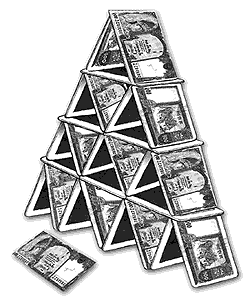 Samrakchhan, a "pyramid scheme" Nepali Times reported on last August ("Scheme/ scam," #54) has almost closed shop, and a company source tells us the firm is refunding the Rs 3,000 it had collected from each member, has wound up operations for the time being because of "high overheads", and is awaiting a court verdict on the legality of its registration before deciding what to do next.
Samrakchhan, a "pyramid scheme" Nepali Times reported on last August ("Scheme/ scam," #54) has almost closed shop, and a company source tells us the firm is refunding the Rs 3,000 it had collected from each member, has wound up operations for the time being because of "high overheads", and is awaiting a court verdict on the legality of its registration before deciding what to do next. Samrakchhan employees we spoke to last week said the company had raised about Rs 10 million before starting the refunds in the wake of the public outcry, and had worked on some projects before it had to close down-Rs 800,000 was spent on cleaning up the Pashupati temple area and some money was spent on helping shoe-shine boys on New Road. It also had plans to help Bir Hospital and had already conducted feasibility studies, but that plan has now been shelved. Samrakchhan says it had also received a large number of scholarship applications and had decided to fund 51, but that has not happened yet.
The scheme, which had on its board prominent Kathmanduites including gender trainer and Prime Minister Sher Bahadur Deuba's wife Arzoo Rana Deuba and Basanta Chaudhari of the Chaudhari group, came to public notice after people started doing the maths. Essentially, Samrakchhan worked like this: you paid Rs 9,000 and were given three certificates with your name in seventh position. This gave you the right to sell three certificates yourself, for Rs 9,000 each. Of the money you got from each new recruit, you deposited Rs 3,000 into Samrakchaan's account, another Rs 3,000 into the account of the first person on the certificate, and kept the remaining one-third. If you sold all three certificates, you recovered your initial investment and moved up to sixth position on your recruits' certificates. As this scheme progressed, more people bought and sold the certificates, eventually you would reach the top of the list and could "earn" up to Rs 6.56 million.
The problem was the numbers. For Samrakchaan to deliver on its promise of making every subscriber a millionaire, there would have to be a never-ending supply of new investors. The chain ends for buyers when they sell to three people, those buyers sell to three more, and on until the 2,187th person in this "pyramid" sells his certificates. Then, you could win over Rs 6 million. For one person to hit the jackpot, 3,280 people must be involved in the scheme. If Nepal's entire population played, 6,500 people would win. You could win, but only if you bought very early Samrakchaan would make Rs 9.8 million from one chain, and it had made something like Rs 15 million from the 5,000 members it had enrolled at the time of our first report.
And, Samrakchhan's brochure said, its mission was to develop Nepal while creating opportunities for independent gain. Samrakchhan was modelled after similar schemes around the world, including one in Albania which shattered the country's economy and ended in rioting in Tirana that left 2,000 dead, and the Italian scheme Pentagono that many Kathmandu residents are familiar with. But Archana Karki, who started the scheme in Nepal, told us she started the scheme here because the popularity in Kathmandu of pyramids such as Pentagono was resulting in huge sums of money leaving the country. Although Karki was quick to explain that Samrakchhan was set up purely with social service in mind and that the seven members of the team agreed at their first meeting not to receive salaries or dividends, the company was registered as a profit-making firm at the Company Registrar's Office. Samrakchhan's registration papers only claimed that it was a "social marketing" company, although the Lalitpur Tax Office treated it as a "lottery".
When the controversy started snowballing, because a number of influential people were involved in it, the Company Registrar's Office ordered it to close down. A Samrakchhan source tells us that the firm has filed a lawsuit challenging that decision. The company also says that because of what could be a long-drawn legal battle, it began refunding the Rs 3,000 it had kept from each member starting 15 August last year. So far about 3,985 members have collected the refund and another 880 are yet to do so. Some members who have taken their refund told us they had either managed to sell their certificates to three members and had managed to break even, but many said they had lost the rest of their investment. An accountant who sold his certificates shares and broke even then bought two more memberships from his own chain (to ensure that he got to the top of the list faster) told us that he lost about Rs 6,000 on one membership.
Samrahchhan says the money that has not yet been refunded is still safe in its bank and that its database of members is intact. But little is known of what has happened to the many similar schemes that were doing the rounds when Samrakchhan was in its prime, such as 1 Uno, Smartcash, Magicman, Sambandha, PC City, and other schemes that promise computers or gold giveaways. There are also no governmental or legislative checks in place yet, to ensure that pyramid schemes are not institutionalised as legitimate free-market enterprises.


